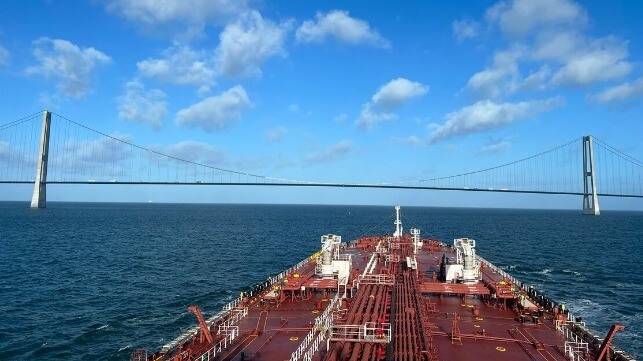Denmark May Begin Checking Russian Tankers' Insurance in Baltic

As part of a package of new EU measures targeting Russian exports and revenue streams, Denmark may soon be tasked with inspecting "shadow fleet" tankers passing through the narrow Danish straits, adding a new layer of friction for Russian oil exports out of the Baltic.
About 60 percent of Russia's seaborne oil exports depart from Primorsk, near St. Petersburg in the eastern Baltic. The volume of traffic amounts to about three large tankers daily. To get from the Baltic to the open sea, laden crude tankers must use the deep route through the Storebaelt (Great Belt). Denmark administers this busy waterway, and DanPilot provides pilotage. Tens of thousands of vessels pass through the Great Belt every year, andd the risks to shipping from the sharp bends, shoals and frequent low visibility have been understood for hundreds of years.
The straits are considered international shipping lanes, but given the known hazards and the fact that the waterway is well within the 12-mile line, Denmark has administrative control as the coastal state. Given the higher average age of the "shadow" tanker fleet that serves Russian interests, there is an additional need to ensure adequate coverage for the risk of a spill.
The EU proposal would use Denmark's authority to inspect and regulate tankers with questionable insurance in its own waters. Under G7 sanctions, Western insurers (the market-dominating International Group) are not allowed to cover Russian oil cargoes priced above $60 per barrel. Russian oil almost universally trades above this price, and one method that Russian exporters have used to circumvent the cap is to use insurance from less-established insurers based outside of the G7.
For cargoes out of the Baltic, these suspect insurance arrangements could be scrutinized by Danish authorities going forward, and could be grounds for delaying or detaining non-compliant tankers. "The key is enforcing the insurance regulations,” an EU official told the FT. “It’s being done very patchily at the moment."

that matters most
Get the latest maritime news delivered to your inbox daily.
According to the FT, the EU may also consider targeting the flag states that provide registry services to "shadow fleet" vessels.
However, Reuters reports that there is no language regarding Danish inspections or Russian tankers in the new EU sanctions package, and that Russian tankers will not be targeted.
